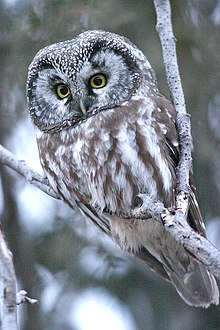Tengmalm's owl
| Boreal owl | |
|---|---|
 |
|
| Amherst Island, Ontario, Canada | |
| Scientific classification | |
| Kingdom: | Animalia |
| Phylum: | Chordata |
| Class: | Aves |
| Order: | Strigiformes |
| Family: | Strigidae |
| Genus: | Aegolius |
| Species: | A. funereus |
| Binomial name | |
|
Aegolius funereus (Linnaeus, 1758) |
|
| Subspecies | |
|
7, see text |
|
 |
|
| Range of A. funereus | |
| Synonyms | |
|
Nyctala tengmalmi |
|
7, see text
Nyctala tengmalmi
Cryptoglaux tengmalmi
Glaux funerea
The boreal owl (Aegolius funereus) is a small owl. In Europe, it is typically known as Tengmalm's owl after Swedish naturalist Peter Gustaf Tengmalm or, more rarely, Richardson's owl after Sir John Richardson. The scientific name is from Latin. The genus name Aegolius is a type of screech owl thought to be a bird of ill omen, and funereus means "funereal".
This species is a part of the larger grouping of owls known as typical owls, Strigidae, which contains most species of owl. The other grouping is the barn owls, Tytonidae. Due to its shyness and evasive reaction to human activities, nocturnal habits and preferred inaccessible taiga forest habitat, it ranks as one of the, if not the, least known owls in both North America and Europe.
The boreal owl is 22–27 cm (8.7–10.6 in) long with a 50–62 cm (20–24 in) wingspan. It is brown above, with white flecking on the shoulders. Underparts whitish streaked with rust. The head is large, with yellow eyes and a white facial disc, and a "surprised" appearance. The beak is light yellow colored rather than dark like its relative the northern saw-whet owl. The flight is strong and direct. Young birds are chocolate brown.
The boreal owl is an unsociable nocturnal owl. Its call is similar in sound to the "winnowing" of the North American Wilson's snipe. This species is not normally migratory, but in some autumns significant numbers move further south. It is rarely any great distance south of its breeding range, although this is partly due to the problems of detecting this nocturnal owl outside the breeding season when it is not calling.
The boreal owl breeds in dense coniferous forests across northern North America and Eurasia, and in mountain ranges such as the Alps and the Rockies. It lays 3–6 eggs in a tree hole. Across much of Europe, and to a lesser extent in Asia and North America, naturalists and biologists put up nest boxes for these and other small owls.
...
Wikipedia

